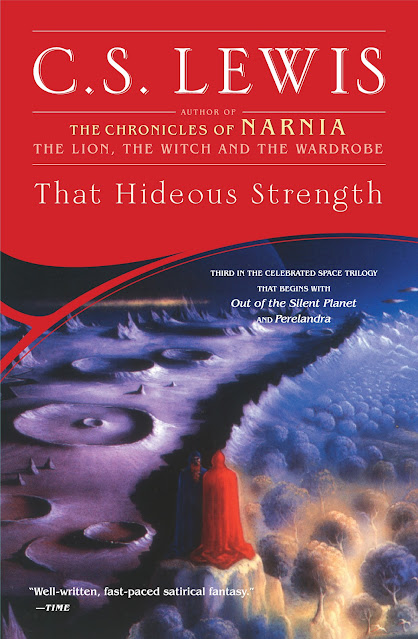In contrast to the two previous installments of the "Space Trilogy" the story of That Hideous Strength: A Modern Fairy Tale for Grown-Ups is set on Earth (or Thulcandra as it's also known in the trilogy). The action concerns a group of college academics who are lured into becoming part of a dangerous conflict between two philosophies. Out the Silent Planet evoked First Men to the Moon by H.G. Wells. and Perelandra brought to mind Voyage to Arcturus by David Lindsey, while That Hideous Strength seems to evoke the kind of sci-fi and fantasy menace which was a staple of the Quatermass yarns a decade later. The story begins in the most mundane way at a college filled with the abstracted minds which populate such establishments plodding through their lives and workdays filled with small dramas and noisome struggles.
We follow a married couple who are headed in different directions. Mark is the husband, an up-and-coming member of a small rustic college who is playing the game of politics which seem to be a part of all aspects of human life. He is a man who celebrates modern ideas and notions and imagines that human beings can be made better with the proper guidance and environment. His wife Jane, also an intellectual is left behind somewhat in the wake of Mark's ambitions but begins to have dreams which turn out to be both prophetic and true. She is taken in by a group who stand in opposition to NICE, an atheistic organization with a disdain for individual suffering in the cause of making mankind something else. Mark has been scooped up by NICE and promised power. How these two people react to the problems and threats they encounter is the core of the story.
This much longer story is connected to his prequels when the protagoniist of those novels shows up at last in this story, playing a rather different role. That Hideous Strength is a novel which seems longer than it needs to be. Much of what happens in the first one hundred pages is not unimportant, but could've been collapsed into a shorter span. Certainly, Lewis had some reason for treating us to intentionally bland meetings of college professionals, a dreary crowd of graspers who celebrate intellect as much as they seem to have disdain for their fellow man. The notions of Christianity are celebrated (no surprise there of course) but combined with a strange acceptance of pagan worship (the resurrection of Merlin being one instance). The battle here is not between Christian and pagan, but between a world view in which there is more than man and one in which there is not. I'll let you read the book if you choose to see who prevails.
Rip Off





No comments:
Post a Comment